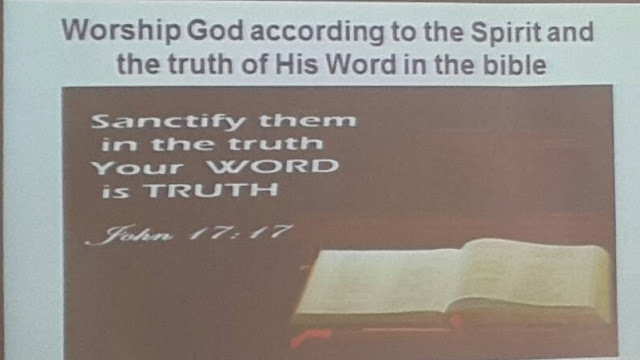Title: Motherhood Revived! From Life to Life
Text: 2 Kings 4:8-37; 8:1-6
Ms Beh
Text: 2 Kings 4:8-37; 8:1-6
Ms Beh
The speaker admitted she still has many struggles as a mother and still has a long way to go and grow as a mother. Today's message is not only for biological mothers, but also for spiritual mothers and fathers too, because the same principles apply. Going through difficult times as a mother is normal and expected. But that is not where we start, because we have God who can bring new life and new hope into our lives. As a former nurse, the speaker had witnessed diseases draining away the lives of many ER patients in the past. In the same way, many challenges and struggles can drain away our life as a mother.
The Shunammite's Son Restored to Life
V8 One day Elisha went to Shunem. And a well-to-do woman was there, who urged him to stay for a meal. So whenever he came by, he stopped there to eat.
Setting: The ministry of Elisha against the backdrop of Israelite kings
- Ahab was the king that introduced Baal worship
- Thus, judgment was pronounced on Ahab and his household
*Unifying thread from 2 Kings chapters 2-8:
- obedience leads to blessings
- disobedience leads to curses such as: desert/famine: failure of crops, defeat: failure of military power, death: failure in life.
Outline
1. When we depend on our own strength and wisdom to nurture the next generation, motherhood leads to despondency and disillusion (4:8-17).
Self-sufficiency brings Despondency and Disillusion (2 Kings 4:8-17)
*Comfort in life has the potential to cultivate a self-reliant outlook (4:8-10)
*Self interest can lead to misuse and abuse of our God-given gifts and efforts (4:11-18).
- The promise DID NOT involve God
- The promise was a result of self- directed effort (observed by Gehazi and reported to Elisha).
When we depend on our own strength and wisdom to nurture the next generation, motherhood will lead to despondency and disillusion. When we raise children based on the influence of the world as to what is important, we will lose track of our priorities in raising children. When we take the future of our children and steer it in our own hands; when we set the course of their lives based on what we think is right, we are setting ourselves up for despondency and disappointment down the road. Children are gifts from God. They are like arrows in our hands; they are to be aimed and shot to the target, not our target but God's target.
2. When we lean upon God in endurance and trust, motherhood is revitalised and life giving (4:18-37; 8:1-6).
Reliance on God gives Revitalisation and Life
*Crises are God-ordained opportunitic moments that lead us from self-centredness to God (4:18-25a)
- The joy of motherhood was very quickly replaced by pain,
heartache and suffering of the child's death (4:18-20)
- The crises in motherhood drives us to God (4:21-25a)
The turning point of the whole story comes in Verse 33 - "Elisha prayed to the Lord."
*God's grace in the midst of life's many sufferings is the beacon of life-giving hope (4:25b-38: 8:1-6)
Where do we go from here? 3 things to help us to navigate through motherhood, whether we are biological or spiritual mother.
God is not mentioned in the passage.
32 When Elisha reached the house, there was the boy lying dead on his couch. 33 He went in, shut the door on the two of them and prayed to the LORD.
The turning point of this story was Elisha prayed to God. First time, God was involved in this story for the first time.
A revived motherhood
Recognise the gifts and strength that have been given to us (e.g. biological mothers, spiritual mothers)
Realign our priorities in raising biological or spiritual children:
- What is important to God in this child?
- What is the priority in each season of life?
Rely on God and His wisdom and power for things that are within and beyond our human control.
Release the control.
Recognise the gifts and strength that have been given to us (e.g. biological mothers, spiritual mothers)
Realign our priorities in raising biological or spiritual children:
- What is important to God in this child?
- What is the priority in each season of life?
Rely on God and His wisdom and power for things that are within and beyond our human control.
Release the control.
Relationship as a path of suffering. "The deepest things that I have learned in my own life have come from the deepest suffering. Out of the deepest waters and the hottest fires have come the deepest things that I know about God..... I would add this that the greatest gifts of my life have also entailed the greatest suffering. The greatest gifts of my life for example have been marriage and motherhood. And let's never forget that if we don't ever want to suffer, we must be very careful never to love anything or anybody." - Elizabeth Elliot.
Our deepest experience as human beings revolves around relationships, especially family relationships. There will be times when our journey together as mothers and children, or as fathers and children, that we will bear scars and tears but all of these God can revive. Our scars can become marks of God's victory and God's grace in our lives when we centre our hope in Him. Our hope for the future is not in our children. Our hope for the future and for their future is in God. He alone can bring life.
Conclusion: As we struggle through the difficulties in raising children, choose to trust in God and believe in Him as the centre and the source of motherhood.
1. Share one joy and one challenge of motherhood. It can be your own joy/challenge or the joy/challenge of your mother in raising you.
2. As a disciple of Jesus Christ, how can we be a "mother" to someone? What are the roles and responsibilities of being a "mother" in this context?
3. Share with your Connect Group a breakthrough moment when you choose to trust in God in motherhood (or fatherhood).
































